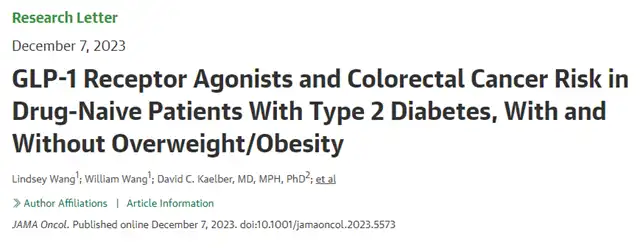“Miracle Weight-Loss Drug” Semaglutide Significantly Reduces Colorectal Cancer Risk
- Normal Liver Cells Found to Promote Cancer Metastasis to the Liver
- Nearly 80% Complete Remission: Breakthrough in ADC Anti-Tumor Treatment
- Vaccination Against Common Diseases May Prevent Dementia!
- New Alzheimer’s Disease (AD) Diagnosis and Staging Criteria
- Breakthrough in Alzheimer’s Disease: New Nasal Spray Halts Cognitive Decline by Targeting Toxic Protein
- Can the Tap Water at the Paris Olympics be Drunk Directly?
“Miracle Weight-Loss Drug” Semaglutide Significantly Reduces Colorectal Cancer Risk
- Should China be held legally responsible for the US’s $18 trillion COVID losses?
- CT Radiation Exposure Linked to Blood Cancer in Children and Adolescents
- FDA has mandated a top-level black box warning for all marketed CAR-T therapies
- Can people with high blood pressure eat peanuts?
- What is the difference between dopamine and dobutamine?
- How long can the patient live after heart stent surgery?
“Miracle Weight-Loss Drug” Semaglutide Significantly Reduces Colorectal Cancer Risk
The glucagon-like peptide-1 receptor agonist (GLP-1RA), a type 2 diabetes treatment approved for its ability to suppress appetite and reduce dietary intake, including semaglutide and liraglutide, has gained prominence in the weight loss community due to its exceptional slimming effects.
Given the multifaceted effects of GLP-1RA in lowering blood sugar, inducing weight loss, and regulating immune function, coupled with obesity being a major risk factor for colorectal cancer (CRC), researchers delved into the relationship between GLP-1RA and CRC risk in patients with type 2 diabetes.
On December 7, 2023, researchers from Case Western Reserve University School of Medicine in the United States published a study titled “GLP-1 Receptor Agonists and Colorectal Cancer Risk in Drug-Naive Patients With Type 2 Diabetes, With and Without Overweight/Obesity” in the JAMA Oncology journal.

The study revealed that, irrespective of obesity status, GLP-1RA was associated with a lower risk of colorectal cancer compared to other anti-diabetic drugs. When compared to insulin, GLP-1RA treatment lowered the risk of developing colorectal cancer by 44%, and when compared to metformin, the risk reduction was 25%.
In this study, researchers analyzed over 1.22 million patients with type 2 diabetes from 59 medical organizations across 50 states in the United States. These patients, whether obese or not at baseline, had no history of colorectal cancer. The study compared GLP-1RA with seven non-GLP-1RA anti-diabetic drugs and assessed the impact of GLP-1RA on the risk of CRC in patients with type 2 diabetes.
The seven non-GLP-1RA anti-diabetic drugs included insulin, metformin, alpha-glucosidase inhibitors, dipeptidyl peptidase-4 (DPP-4) inhibitors, sodium-glucose co-transporter-2 (SGLT2) inhibitors, sulfonylureas, and thiazolidinediones.
During the 15-year follow-up period, among 22,572 diabetes patients treated with insulin, 167 cases of colorectal cancer were reported. In the matched group of 22,572 diabetes patients treated with GLP-1RA, there were 94 cases of colorectal cancer.
Compared to insulin treatment, the risk of developing colorectal cancer was 44% lower in diabetes patients treated with GLP-1RA.

Impact of GLP-1RA on CRC in the entire population
Similarly, the researchers compared 18,518 diabetes patients treated with metformin with a matched group of patients treated with GLP-1RA. In this comparison, the risk of colorectal cancer was 25% lower in diabetes patients treated with GLP-1RA compared to those treated with metformin.
Furthermore, the study found that, across the entire population, GLP-1RA treatment was associated with a lower risk of colorectal cancer compared to the other five non-GLP-1RA anti-diabetic drugs.
Finally, the researchers analyzed the impact of different drugs on the incidence of CRC in overweight/obese patients. In this subgroup, compared to insulin, GLP-1RA treatment reduced the risk of developing colorectal cancer by 50%, and compared to metformin, the risk reduction was 42%.

Impact of GLP-1RA on CRC in obese people
The researchers concluded that, regardless of obesity status, GLP-1RA treatment in diabetes patients is associated with a lower incidence of colorectal cancer, with a greater risk reduction observed in overweight/obese individuals.
In summary, the results suggest that, in the prevention of colorectal cancer, GLP-1RA is more effective than commonly prescribed anti-diabetic drugs.
Paper Link:
DOI: 10.1001/jamaoncol.2023.5573
“Miracle Weight-Loss Drug” Semaglutide Significantly Reduces Colorectal Cancer Risk
(source:internet, reference only)
Disclaimer of medicaltrend.org
Important Note: The information provided is for informational purposes only and should not be considered as medical advice.



